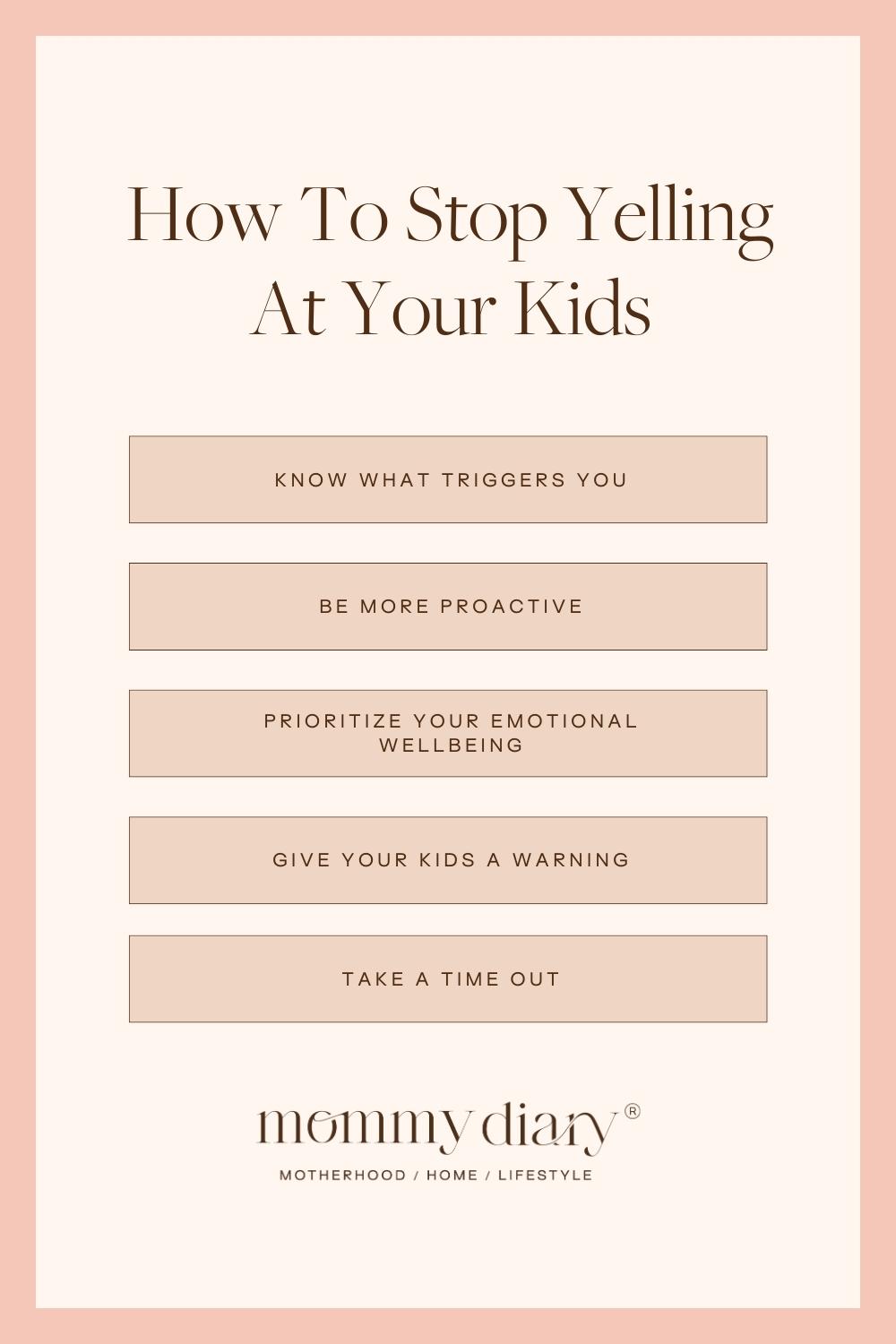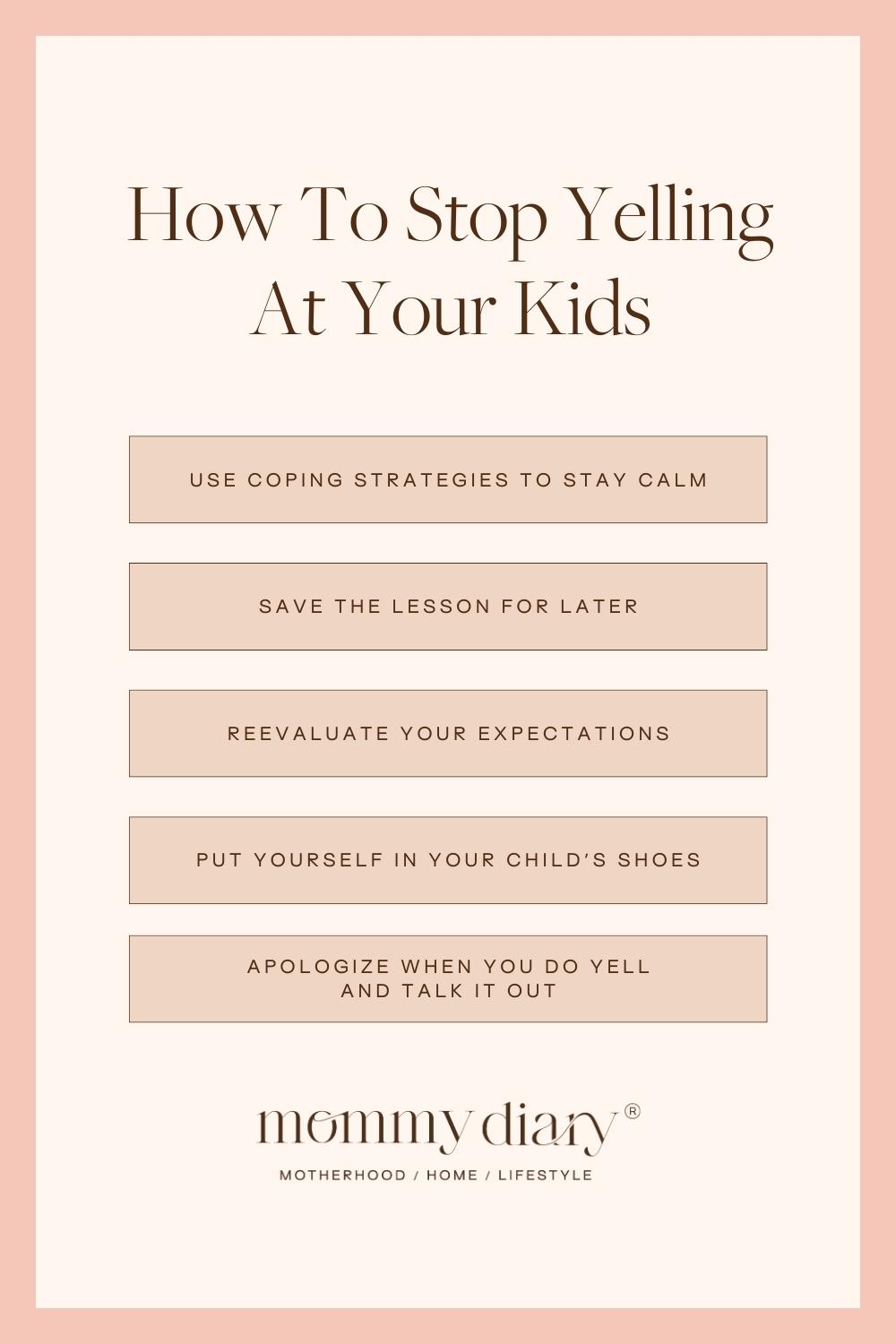We’re human. No matter how hard we try to do right by our kids, we make mistakes. Plus, parenthood brings up a lot of emotions, including anger.
Yelling is often a default reaction when you’ve been pushed to your limits. It’s in these moments, when I’m tired and overworked, that I find myself yelling at my kids. I know firsthand just how terrible it can make you feel afterward, especially once you realize how much your yelling scares your kids.
Did you know that yelling at your kids can negatively affect their emotional, mental, and social wellness? It’s true, as is the fact that frequently yelling at your children can strain your relationship with them.
The good news is that there are ways you can still get your message across without yelling at your kids. I’m sharing practical tips on how to better control your emotions and put a stop to all of the yelling.
How To Stop Yelling At Your Kids

Know What Triggers You
When parents yell at their kids, it’s typically in response to specific behaviors or situations. Ask yourself: What is something that is guaranteed to set me off? When you recognize what triggers you, you can work on responding more effectively.
Knowing your triggers also allows you to plan your response. For example: if this happens, then I will do that. It also helps to remind yourself what kind of parent you want to be. No one wants to be the type of parent who constantly yells at their kids. What kind of parent do you want to be instead?
Be More Proactive
Are there specific situations that typically escalate into a shouting match? Maybe you often find yourself yelling at your kids to get ready for school in the morning. Being more proactive can often prevent frequent outbursts.
More specifically, if mornings are stressful in your home, try taking care of a few tasks the night before. Whether it’s laying out your child’s clothes or packing their lunch ahead of time, these simple gestures can make a huge difference.
Prioritize Your Emotional Wellbeing
Have you ever yelled at your kids and then later realized your reaction had less to do with them and more to do with yourself? Believe it or not, yelling can often be a reaction to your own unmet needs.
It’s hard to be a calm, gentle parent when you’re feeling overtired, overworked, and underappreciated. Take the time to look inward and recognize when you need to work on yourself to be a better parent to your kids.
Give Your Kids A Warning
Sometimes a simple warning is all it takes to get your kids to listen and follow your instructions. If you notice yourself getting frustrated or irritated, warn your children about your dwindling patience. It can be something as simple as saying “I don’t want to yell at you. Please listen to me or I’m going to raise my voice.”
Giving your child a warning can also make transitions easier. For example: if your child is ignoring your repeated requests to get ready for bed, giving them a five-minute heads up lets them finish what they’re doing and mentally prepare for the transition from playtime to bedtime.
Take A Time Out
“If we’re committed to mindfully changing our behavior and just taking a few minutes out before we do anything, it really helps us practice better self-control,” child development specialist Judy Arnall explained.
Arnall, author of Parenting With Patience and Discipline Without Distress, revealed that when she needs a time out, she goes into the bathroom and yells into the toilet, rather than at her kids, and then flushes it.
You can try Arnall’s technique, or you can come up with a different way to take a time out when you need one. The idea is to walk away from the situation and allow yourself to calm down when your child pushes your buttons.

Use Coping Strategies To Stay Calm
Unfortunately, taking a time out isn’t always an option. In situations where you can’t step away for a minute, a coping strategy can mean the difference between a hiccup and a total meltdown.
Common coping strategies include meditating and deep breathing. Try a few different techniques until you find what works for you.
One of my personal coping strategies is journaling. It allows me to process my emotions and relieve any built-up stress and tension.
Save The Lesson For Later
If you really want your kids to listen, you have to use an effective form of communication. Yelling at your kids when they don’t listen to you will only lead to them shutting down. To get your point across, avoid trying to teach a lesson right then.
As hard as it can be to hold off on lecturing your children, practicing self-control and saving the teaching moment for later sends a more effective message in the long run.
When both you and your child are calm, then you can talk it out. Reiterate your expectations and the consequences of their actions. Stay calm and make eye contact to get your point across. Communicating this way usually yields much better results.
Reevaluate Your Expectations
Remember that kids will be kids. Children are immature. They’re still learning how the world works. It’s our duty as parents to help guide them in the right direction, whether it’s related to emotional control or pushing boundaries.
No matter how much empathy and respect your children receive from you, you can still expect some childlike behavior. If you’re expecting your children to behave more like adults, perhaps it’s time to reevaluate your expectations.
Put Yourself In Your Child’s Shoes
Many children simply want to feel seen and understood. Try to see things from their perspective and remind them that you’re on their side, not against them.
Create a safe space for them to discuss their feelings. Empathize with them. Show them that you want to understand how they’re feeling and why they’re feeling it. Doing so is surprisingly effective at preventing issues later on.
Apologize When You Do Yell And Talk It Out
Try as you might to avoid it, you’re bound to yell at your kids. It happens to all of us. When it does happen, apologize.
Circling back and apologizing to your kids after you lose your cool can teach your child an important lesson: that sometimes our emotions cause us to do or say things we aren’t proud of.
Modeling appropriate behavior by apologizing after you lose your temper can help your child learn more about how their behavior impacts their environment. Apologize and talk with your child about ways the two of you can work together to prevent it from happening again.

While yelling at your kids doesn’t make you a bad parent, there are ways to stay calm and still get your point across.
Don’t be so hard on yourself. Every parent yells at their kids. But if you find yourself yelling more than you’d like, these tips can help.
For more on parenting and motherhood, head over to the blog.

